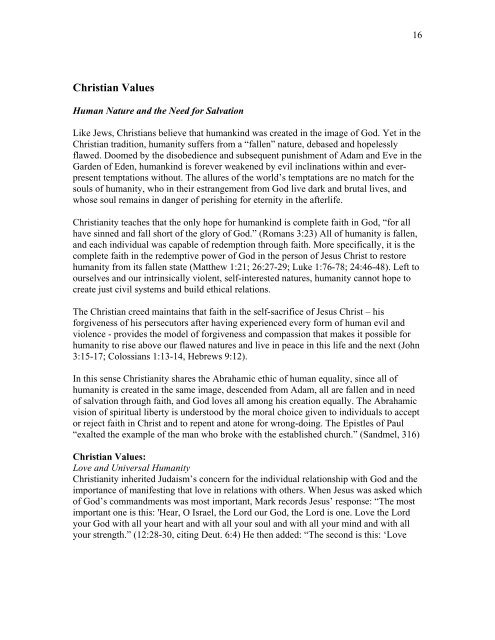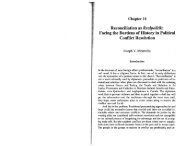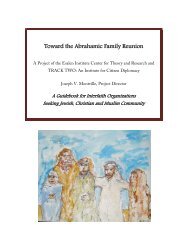The Ethics and Pro-Social Values in Judaism, Christianity and Islam ...
The Ethics and Pro-Social Values in Judaism, Christianity and Islam ...
The Ethics and Pro-Social Values in Judaism, Christianity and Islam ...
Create successful ePaper yourself
Turn your PDF publications into a flip-book with our unique Google optimized e-Paper software.
16<br />
Christian <strong>Values</strong><br />
Human Nature <strong>and</strong> the Need for Salvation<br />
Like Jews, Christians believe that humank<strong>in</strong>d was created <strong>in</strong> the image of God. Yet <strong>in</strong> the<br />
Christian tradition, humanity suffers from a “fallen” nature, debased <strong>and</strong> hopelessly<br />
flawed. Doomed by the disobedience <strong>and</strong> subsequent punishment of Adam <strong>and</strong> Eve <strong>in</strong> the<br />
Garden of Eden, humank<strong>in</strong>d is forever weakened by evil <strong>in</strong>cl<strong>in</strong>ations with<strong>in</strong> <strong>and</strong> everpresent<br />
temptations without. <strong>The</strong> allures of the world’s temptations are no match for the<br />
souls of humanity, who <strong>in</strong> their estrangement from God live dark <strong>and</strong> brutal lives, <strong>and</strong><br />
whose soul rema<strong>in</strong>s <strong>in</strong> danger of perish<strong>in</strong>g for eternity <strong>in</strong> the afterlife.<br />
<strong>Christianity</strong> teaches that the only hope for humank<strong>in</strong>d is complete faith <strong>in</strong> God, “for all<br />
have s<strong>in</strong>ned <strong>and</strong> fall short of the glory of God.” (Romans 3:23) All of humanity is fallen,<br />
<strong>and</strong> each <strong>in</strong>dividual was capable of redemption through faith. More specifically, it is the<br />
complete faith <strong>in</strong> the redemptive power of God <strong>in</strong> the person of Jesus Christ to restore<br />
humanity from its fallen state (Matthew 1:21; 26:27-29; Luke 1:76-78; 24:46-48). Left to<br />
ourselves <strong>and</strong> our <strong>in</strong>tr<strong>in</strong>sically violent, self-<strong>in</strong>terested natures, humanity cannot hope to<br />
create just civil systems <strong>and</strong> build ethical relations.<br />
<strong>The</strong> Christian creed ma<strong>in</strong>ta<strong>in</strong>s that faith <strong>in</strong> the self-sacrifice of Jesus Christ – his<br />
forgiveness of his persecutors after hav<strong>in</strong>g experienced every form of human evil <strong>and</strong><br />
violence - provides the model of forgiveness <strong>and</strong> compassion that makes it possible for<br />
humanity to rise above our flawed natures <strong>and</strong> live <strong>in</strong> peace <strong>in</strong> this life <strong>and</strong> the next (John<br />
3:15-17; Colossians 1:13-14, Hebrews 9:12).<br />
In this sense <strong>Christianity</strong> shares the Abrahamic ethic of human equality, s<strong>in</strong>ce all of<br />
humanity is created <strong>in</strong> the same image, descended from Adam, all are fallen <strong>and</strong> <strong>in</strong> need<br />
of salvation through faith, <strong>and</strong> God loves all among his creation equally. <strong>The</strong> Abrahamic<br />
vision of spiritual liberty is understood by the moral choice given to <strong>in</strong>dividuals to accept<br />
or reject faith <strong>in</strong> Christ <strong>and</strong> to repent <strong>and</strong> atone for wrong-do<strong>in</strong>g. <strong>The</strong> Epistles of Paul<br />
“exalted the example of the man who broke with the established church.” (S<strong>and</strong>mel, 316)<br />
Christian <strong>Values</strong>:<br />
Love <strong>and</strong> Universal Humanity<br />
<strong>Christianity</strong> <strong>in</strong>herited <strong>Judaism</strong>’s concern for the <strong>in</strong>dividual relationship with God <strong>and</strong> the<br />
importance of manifest<strong>in</strong>g that love <strong>in</strong> relations with others. When Jesus was asked which<br />
of God’s comm<strong>and</strong>ments was most important, Mark records Jesus’ response: “<strong>The</strong> most<br />
important one is this: 'Hear, O Israel, the Lord our God, the Lord is one. Love the Lord<br />
your God with all your heart <strong>and</strong> with all your soul <strong>and</strong> with all your m<strong>in</strong>d <strong>and</strong> with all<br />
your strength.” (12:28-30, cit<strong>in</strong>g Deut. 6:4) He then added: “<strong>The</strong> second is this: ‘Love




